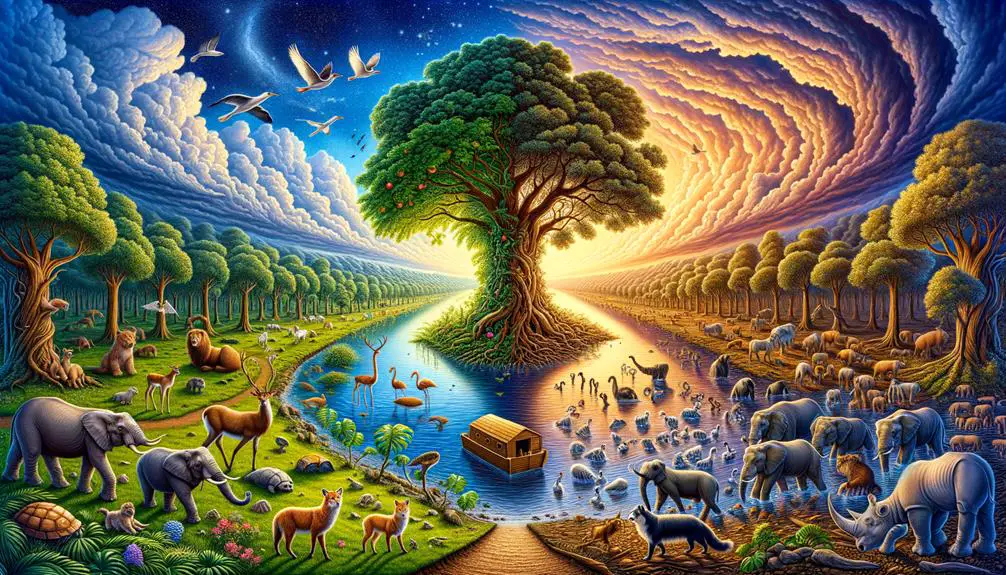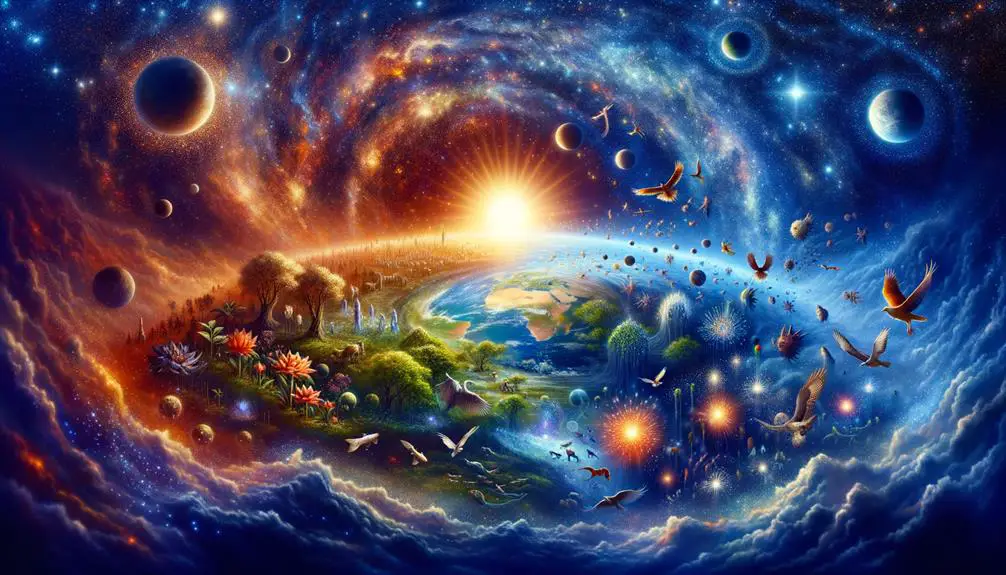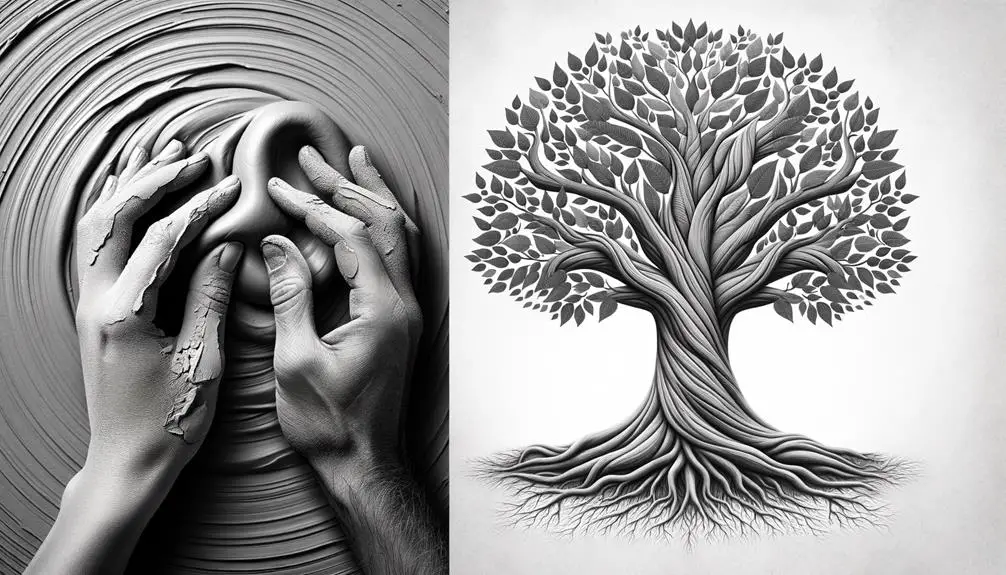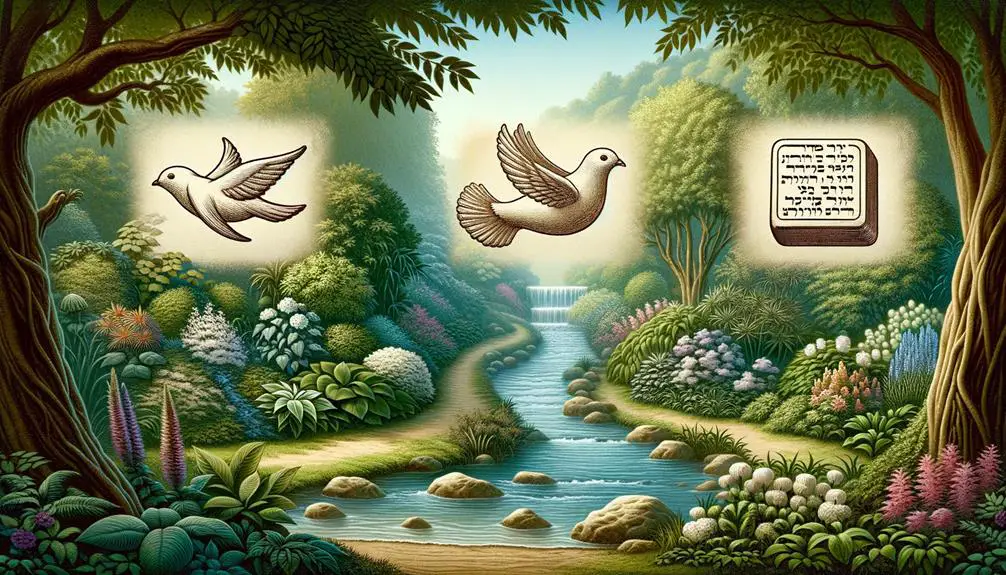Oft overlooked, the two creation stories in Genesis reveal profound mysteries about the divine—discover what sets them apart.

2 Creation Stories in the Bible
As the old saying goes, 'In the beginning…' But did you know the Bible presents not one, but two narratives of creation in Genesis? You've likely heard them in passing, yet they hold distinct differences that have puzzled theologians and scholars alike.
The first narrative, found in Genesis 1, offers a structured, seven-day account of the world's creation, emphasizing order and the omnipotence of God. In contrast, Genesis 2 provides a more intimate portrayal, focusing on the creation of humans and their immediate environment. These divergences raise intriguing questions about the nature of these texts and their implications for understanding the divine.
If you're intrigued by how these two stories reflect and influence Judeo-Christian thought, there's much to uncover in their depths.
Key Takeaways
- The Bible presents two distinct creation narratives, each emphasizing the omnipotence and wisdom of God in the universe's formation.
- Themes of divine power and human purpose highlight the unique responsibilities and stewardship entrusted to humanity by God.
- Symbolic elements, such as light and cosmic battles, illustrate the triumph of order over chaos and the moral structure of creation.
- These narratives offer profound insights into the nature of divine-human relationships and the moral order governing existence.
The First Narrative: Genesis 1

The first narrative, Genesis 1, meticulously outlines the process of creation, emphasizing a structured and sequential divine intervention over six days. This depiction serves as a cosmic calendar, a conceptual framework positioning the origins of the universe within a week-like structure. You're invited to perceive time from a divine perspective, where each 'day' encapsulates monumental acts of creation. This approach not only simplifies the complex act of creation for human understanding but also instills a sense of order and purpose inherent in the universe's fabric.
Light symbolism, introduced at the very beginning, 'Let there be light,' is pivotal in this narrative. It's not just the creation of a physical phenomenon but also a metaphorical illumination of the world from divine darkness. This act of separating light from darkness on the first day establishes a recurring motif of separation and order throughout Genesis 1. You're encouraged to see light as a symbol of knowledge, goodness, and divine presence, contrasting the chaos and void that preceded creation.
Analyzing this narrative, you grasp a deeper understanding of the ancient worldview, where cosmic and moral orders are intertwined. The structured progression from void to a habitable world reflects a theological assertion of a universe created with intention and care. By engaging with this narrative through the lens of cosmic calendar and light symbolism, you delve into the foundational beliefs about the universe's origin and the nature of divine intervention. This rich tapestry of imagery and structure in Genesis 1 invites you to ponder the complexities of creation, transcending mere historical or scientific inquiry into the realm of divine mystery and purpose.
Key Themes and Symbols
As you explore the creation stories in the Bible, you'll notice the manifestation of divine power as a central theme, illustrating the omnipotence of God in the universe's creation.
The narrative on human creation and purpose underscores humanity's unique position and responsibilities within this order, reflecting on moral and ethical implications.
The portrayal of nature and moral order further emphasizes the interconnectedness of all creation, suggesting a harmonious design intended by the divine.
Divine Power Manifestation
Throughout various creation narratives in the Bible, divine power manifests through symbolic acts and themes, underscoring the omnipotence of a deity in shaping existence. You'll notice cosmic battles and mythological parallels that highlight this divine authority, distinguishing the biblical account from other ancient narratives.
These cosmic battles aren't just literary devices; they symbolize the triumph of order over chaos, a central theme in the biblical creation. This victory isn't merely for show. It's a demonstration of divine will imposing structure on the formless void, an act that itself is rich in symbolism.
These mythological parallels draw lines between the biblical deity's power and that of gods from neighboring cultures, yet they also underscore a unique assertion: the singular, unmatched power of the biblical God in crafting the cosmos and ordaining its order.
Human Creation and Purpose
In biblical narratives, human creation and purpose are intricately woven with themes of stewardship and divine image, revealing a complex interplay between humanity and the divine. This narrative framework not only offers insight into the theological anthropology of ancient cultures but also engages directly with contemporary discussions, such as the evolution debate.
By positioning humans as both the image of the divine and stewards of creation, these stories navigate the tension between divine sovereignty and human agency, offering a unique lens through which to view the evolution debate. Moreover, they resonate with cultural myths worldwide, suggesting a universal quest to understand human origin and purpose.
This intertextuality enriches our understanding of human creation, casting it as a multifaceted concept that transcends the boundaries of culture and time.
Nature and Moral Order
Exploring the biblical narratives, you'll find that nature and moral order are deeply entwined, serving as key themes and symbols that underscore the text's complex theological framework. This interconnection offers profound insights into the relationship between divine intention and human action.
The narratives often depict:
- Cosmic chaos as a precursor to divine creation, emphasizing order's triumph over disorder.
- Ethical dilemmas faced by individuals and communities, illustrating the consequences of aligning or deviating from moral law.
- The natural world as a reflection of divine wisdom and justice, reinforcing the imperative for humans to live in harmony with it.
These elements highlight the Bible's portrayal of a world where moral law is integral to the fabric of the universe, guiding human conduct and reflecting divine justice.
The Second Narrative: Genesis 2
Shifting focus to Genesis 2, we encounter a distinct creation narrative that intricately details the formation of humans and their immediate environment. Unlike the first chapter, which presents a more systematic creation of the world, Genesis 2 zooms into the creation of man and the Garden of Eden, providing a more intimate and detailed account.
This narrative begins with the formation of Adam from the dust, emphasizing the connection between humans and the earth. The spotlight on Adam's creation, followed by his deep sleep, during which Eve is created from his rib, suggests a profound statement on human relationship and interdependence. The location of the Garden, with its detailed geographical indicators, not only situates the narrative within a real or imagined landscape but also highlights the importance of place and setting in the divine plan.
Aspect |
Genesis 2 Insight |
|---|---|
Human Creation |
Formed from dust, emphasizing earthy origins and divine breath of life. |
Garden Location |
Detailed, with geographical references, underlining the narrative's rootedness in a specific place. |
Adam's Sleep |
A pivotal moment; Eve's creation from Adam signifies interconnectedness and partnership. |
In analyzing Genesis 2, you'll notice the narrative's focus on the human experience and the intimate details of their environment. This suggests a nuanced exploration of humanity's role within creation, emphasizing stewardship and relationality. The narrative's depth in detailing the immediate surroundings of the first humans and their formation process invites contemplation on the significance of origins, place, and relationship in the theological and existential understanding of human existence.
Divergences and Interpretations

You'll notice that the creation stories within Genesis exhibit significant differences, prompting a plethora of interpretive perspectives.
These disparities invite you to explore how various traditions and scholars have reconciled or emphasized them to shape their understanding of the biblical text.
Such examination sheds light on the multifaceted nature of scriptural interpretation, revealing layers of meaning that have evolved over centuries.
Genesis Narrative Differences
One might notice significant divergences in the Genesis narrative, which stem from its rich tapestry of interpretations and scholarly analyses. These differences aren't merely academic; they touch upon deeply held beliefs about the origins of humanity and the universe.
The analysis of these divergences often centers on:
- Literary structure,
- Authorship debates, and
- Historical context.
Each of these aspects contributes to a multifaceted understanding of Genesis. Literary structure reveals the compositional techniques that guide the narrative's flow and meaning. Authorship debates shed light on the possible multiple sources that could have influenced the text's final form. Finally, understanding the historical context allows readers to appreciate the narrative within the cultural and religious milieu of its time, offering insights into its enduring relevance and interpretive challenges.
Interpretive Perspectives
Exploring the interpretive perspectives on Genesis, it becomes evident that divergences and interpretations play a crucial role in understanding the text's multifaceted nature. You'll find that historical accuracy and cultural influences significantly shape how individuals and communities perceive Genesis' creation stories.
Scholars often debate the extent to which these narratives should be read as literal accounts versus symbolic or allegorical expressions. This dichotomy hinges on understanding the cultural context in which these stories were written. The ancient Near Eastern environment, replete with its own creation myths, undoubtedly influenced the Genesis authors.
Recognizing this, you appreciate the complexity of interpreting ancient texts. Each interpretation, whether emphasizing historical accuracy or exploring cultural influences, offers unique insights into the profound questions of origin and existence that Genesis seeks to address.
Theological Implications
Throughout history, the theological implications of creation stories in the Bible have profoundly shaped Christian doctrine and believers' understanding of their relationship with the divine. These narratives aren't mere historical accounts; they're imbued with deep theological meanings that have evolved through cultural diffusion and have been interpreted within various eschatological contexts. This evolution reflects the dynamic nature of theological interpretation, influenced by shifting cultural and historical landscapes.
The creation stories serve multiple theological purposes:
- Affirmation of Monotheism: They assert the existence of a single, omnipotent creator God, challenging polytheistic beliefs prevalent in neighboring cultures.
- Foundation of Human Dignity: By portraying humans as created in the image of God, these stories provide a theological basis for the intrinsic worth and dignity of every individual.
- Explanation of Cosmic Order: They present a divine order in the universe, establishing God's sovereignty over creation and humanity's role within that order.
These stories' theological implications extend beyond their literal interpretation. They invite believers to ponder the nature of God, the meaning of human existence, and the structure of the cosmos. The creation narratives are thus central to Christian theological reflection, offering insights into the character of God as creator and sustainer of life. Moreover, they emphasize humanity's responsibility to steward the earth, highlighting ethical dimensions that resonate in contemporary ecological discussions. By engaging with these ancient texts, you're invited into a rich tradition of theological inquiry that bridges past and present, inviting a deeper understanding of your place within the divine story.
Influence on Judeo-Christian Thought

The creation stories in the Bible have deeply influenced Judeo-Christian thought, shaping the spiritual, ethical, and cosmological perspectives of these faith communities. You'll find that these narratives offer a foundation for the rejection of cosmic dualism, affirming instead a universe created and governed by a single, omnipotent deity. This concept, known as ethical monotheism, situates God as both the creator and the moral authority, embedding a sense of purpose and order within the cosmos that reflects divine will.
In your exploration of these stories, you'll notice they extend beyond mere mythological accounts. They serve as a cornerstone for a worldview that emphasizes human responsibility in stewardship of the earth and in relationships with one another. This stewardship is underpinned by the belief in a created order, one that's intrinsically good and deserving of respect and care. The narrative of creation, therefore, isn't just about the origins of the earth and humanity; it's a call to ethical living, grounded in the recognition of a singular, benevolent creator.
Moreover, the rejection of cosmic dualism in favor of ethical monotheism has profound implications for how adherents understand the nature of evil and suffering. Rather than attributing malevolence to opposing deities or forces, the struggles and challenges of life are seen within the context of a fallen creation, one that awaits redemption and restoration. This perspective fosters a sense of hope and resilience, encouraging believers to participate in the restoration of the world through acts of justice, mercy, and compassion.
Frequently Asked Questions
How Do Creation Stories in the Bible Compare With Those in Other Ancient Religions or Mythologies?
You're exploring how ancient narratives frame the universe's origins, focusing on cosmic battles and pantheon parallels.
Unlike singular creation events, many myths feature gods in conflict, shaping worlds through their confrontations. These stories often present a pantheon, a family of deities, each governing aspects of the cosmos, reflecting societal values and natural phenomena.
Your analysis reveals a rich tapestry of belief systems, illustrating diverse interpretations of life's beginnings across cultures.
What Role Do the Creation Stories in the Bible Play in Contemporary Debates on Science and Religion, Such as the Discussion Around Evolution Versus Creationism?
In today's battleground of ideas, where science and religion often clash, the tales of origins you've heard play a pivotal role. They're not just ancient narratives but serve as cosmic symbolism in debates like evolution versus creationism. These stories fuel the fire in discussions on educational reform, pushing you to analyze the interplay between faith and fact.
As you navigate this complex terrain, remember, these creation accounts shape the contours of contemporary discourse.
Have There Been Any Significant Changes in the Understanding or Interpretation of the Bible's Creation Stories Over the Centuries, Particularly With the Advent of Modern Science?
Yes, there have been significant shifts in how you understand and interpret these ancient texts, especially with modern science's rise.
Historical context and literary analysis have allowed you to see these stories not just as literal accounts, but as complex narratives embedded with meaning and culture.
This nuanced view helps bridge the gap between faith and science, showing that interpretations can evolve alongside scientific discoveries without losing their spiritual significance.
How Do Different Jewish and Christian Denominations Reconcile Discrepancies or Contradictions Between the Two Creation Narratives in Genesis?
You're navigating a complex landscape where different Jewish and Christian denominations dissect the seemingly contrasting creation narratives. Through textual analysis, they delve into the subtleties of language and context, unveiling layers of meaning.
Theological perspectives offer a lens to reconcile discrepancies, suggesting that contradictions mightn't be contradictions at all but complementary insights. This analytical, scholarly approach invites you to appreciate the richness and depth of interpretation, transcending literal readings.
What Are the Ethical or Moral Lessons That Can Be Derived From the Creation Stories in the Bible, and How Have These Influenced Societal Norms and Laws?
You can draw key ethical lessons about gender roles and environmental stewardship from these narratives. They've significantly shaped societal norms and laws, advocating for equality and care for our planet.
These stories suggest a balanced relationship between genders and a duty towards Earth's preservation. This interpretation has fueled debates and policies around gender equality and environmental protection, underlining the profound impact these ancient lessons have on modern societal structures and values.
Conclusion
In dissecting the two creation narratives within the Bible, you've navigated through a complex tapestry of themes, symbols, and divergent interpretations. These stories, more than mere accounts of the world's inception, offer a mirror to the theological soul of Judeo-Christian thought.
They underscore the rich layering of meaning and the multifaceted nature of divine interaction with humanity. In essence, peeling back these layers isn't just an academic exercise; it's the key to unlocking a deeper understanding of faith and existence.



Sign up